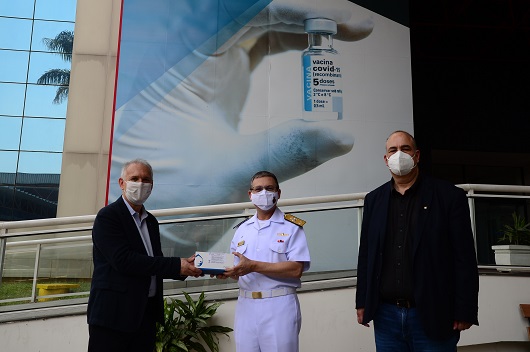New expedition to Antarctica: Fiocruz donates COVID-19 tests to the Navy
24/09/2021
Cristina Azevedo (Fiocruz News Agency)
As part of the preparations for the new Brazilian expedition to Antarctica, Fiocruz donated 3,000 rapid tests to detect Sars-Cov-2 antigens to the Navy. The kits, produced by the Institute of Technology in Immunobiologicals (Bio-Manguinhos/Fiocruz), will be used to test the entire crew on board, on the support flights, the team at the Comandante Ferraz Antarctic Station and the researchers who will be part of the new trip - including the Fioantar team, which leaves in the next weeks. The Fiocruz's Antarctic program expeditions with researchers are being resumed, after the interruption last year due to the COVID-19 pandemic.
Admiral Rocha Martins receives the COVID-19 test's kit from Zuma and Krieger (Photo: Peter Ilicciev)
The symbolic delivery of the tests took place this Tuesday (9/21), during the visit of Rear Admiral Antonio Cesar da Rocha Martins, secretary of the Interministerial Commission for the Sea Resources (Secirm). Accompanied by war captain Marcelo Gomes, advisor to the Brazilian Antarctic Program (Proantar) and former commander of the station, Admiral Rocha Martins was received by Marco Krieger, vice president of Production and Innovation in Health at Fiocruz, and Maurício Zuma, director of Bio-Manguinhos, who said that now, with the tests, the unit “is closer to Antarctica and Fioantar”.
“This is not a Navy program, but a program of the Brazilian State, in which we seek to know the region and guarantee the country a seat in the Antarctic Treaty with the right to vote and voice”, said the admiral. “Having Fiocruz as a partner only reinforces this condition of a State program”.
In the new auditorium of Bio-Manguinhos, the admiral attended a presentation about Fiocruz and also about Fioantar. Krieger highlighted that the Foundation's participation in the Brazilian Antarctic Program dates back to the institution's own DNA, created to face health emergencies and committed to “doing research aimed at solutions”.
“A health emergency like COVID-19 only reinforces the importance of identifying threats before they happen to improve our response”, said Krieger, who also highlighted Fiocruz's mission, to produce and share knowledge.
Fioantar makes it possible to study the impacts of Antarctica's ecosystems on health, recalled Krieger, emphasizing that surveillance is essential, in addition to prospecting for biodiversity and applying it to health. "We want to collaborate".
More space for researchers
In the auditorium, Rocha Martins spoke with researchers from Fioantar. Fernando Couto Motta, from the Laboratory for Respiratory Virus and Measles (IOC/Fiocruz), who participated in the 2019 expedition, thanked the welcome that Fiocruz members have received on the ship and at the station. The admiral, in turn, revealed plans to take researchers also in the winter, to expand the studies. If before the fire the station had 2,500 square meters, today it has 4,500, with the capacity to receive 32 researchers. The new station also houses Fiolab — Fiocruz's permanent laboratory. “We need to move the station with people, with research,” he said.
The admiral explained that Proantar is one of Secirm's four action areas, which also includes the Plan for Sea Resources, the Brazilian Continental Shelf Survey Plan and the National Coastal Management Plan. In conversation with the researchers, the admiral also suggested possible new areas of partnership between the Navy and Fiocruz, such as Blue Amazon (Amazônia Azul), the Brazilian maritime territory also rich in biodiversity.
For researcher Marcia Chame, from the Paleoparasitology Laboratory (ENSP/Fiocruz), this would be a new universe for the Foundation, although she remembers that Oswaldo Cruz built a marine laboratory. About Fioantar, she emphasized its integrated character. “Normally, a research group has a specific project. But we work on the same sample in several different groups hoping that this will generate a leap in knowledge.
The admiral also visited Fiocruz's facilities, such as the Henrique Penna Center (CHP), at the Vaccine Technological Complex (CTV), where the vaccine against COVID-19 is manufactured; the COVID-19 Diagnosis Support Unit (Unadig), where test analysis is carried out; and the Respiratory Virus and Measles Laboratory.


